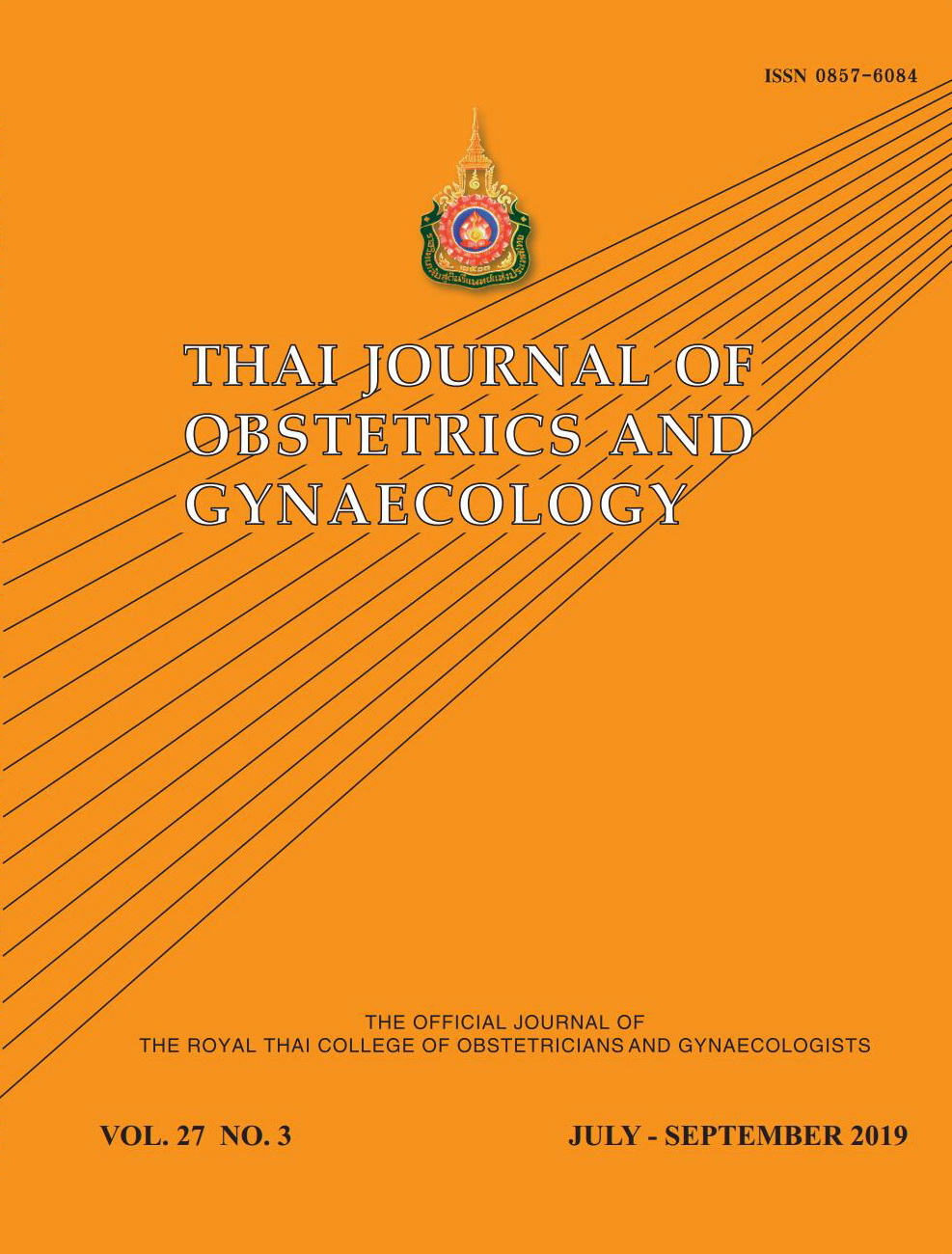Correlation between Serum Dehydroepiandrosterone and Cognitive Function in Thai Pre/ Perimenopause Women Aged 40-49 Years Old: A cross-sectional study
Main Article Content
Abstract
Objectives: To determine correlation between serum dehydroepiandrosterone (DHEA) and cognitive impairment as evaluated by the Montreal Cognitive Assessment (MoCA) in premenopausal/perimenopausal women. The study also evaluated other factors those can affect both cognitive function and DHEA concentrations.
Materials and Methods: A cross-sectional, single population study recruited 101 healthy premenopausal/perimenopausal women aged 40-49 years. The inclusion criteria included participants who did not have i) hormonal treatment including DHEA, ii) previous ovarian operation, and iii) endocrinological, neurological and mental illness. Blood sampling and MoCA test were performed following the written informed consent. The MoCA, a cognitive screening test evaluating 8 compartments of global cognitive function, was all performed by single certified-physician. MoCA < 25 is determined as having cognitive impairment. DHEA concentrations were measured in batch utilizing the deMeditec ELISA kits.
Results: Mean age of the participants was 43.49 ± 2.89 years. Mean DHEA concentration was 16.07 ± 5.45 ng/ml while the MoCA score was 24.12 ± 3.44. Women with impaired cognitive function (MoCA < 25) were 44.6% (45/101). Neither correlation between DHEA-MoCA, Age-DHEA, nor Age-MoCA was observed (r = -0.139, -0.01, -0.12, respectively; p > 0.05). Only women’s years of education was positively correlated with the MoCA score (r = 0.469, p < 0.001). Adjusted odd ratio of serum DHEA on low MoCA (< 25) score was 0.98 (95%CI 0.92, 1.06, p = 0.649 determined by log-regression analysis).
Conclusion: No correlation between serum DHEA concentration and cognitive function as determined by the MoCA score in the premenopausal/perimenopausal population aged between 40-49 years old.
Article Details
References
2. Rainey WE, Carr BR, Sasano H, Suzuki T, Mason JI. Dissecting human adrenal androgen production. Trends Endocrinol Metab 2002;13:234-9.
3. Havelock JC, Auchus RJ, Rainey WE. The rise in adrenal androgen biosynthesis: adrenarche. Semin Reprod Med 2004;22:337-47.
4. Labrie F. Intracrinology. Mol Cell Endocrinol 1991;78:C113-C8.
5. Hemrungrojn S. Montreal Cognitive Assessment (MoCA) Thai version [Internet]. 2011 [cited 2011 Aug 31]. Available from: https://www.mocatest.org/wp-content/uploads/2015/tests-instructions/MoCA-Instructions-Thai.pdf
6. Jellinck PH, Kaufmann M, Gottfried-Blackmore A, McEwen BS, Jones G, Bulloch K. Selective conversion by microglia of dehydroepiandrosterone to 5-androstenediol-A steroid with inherent estrogenic properties. J Steroid Biochem Mol Biol 2007;107:156-62.
7. Mukai H,Takata N, Ishii HT, Tanabe N, Hojo Y, Furukawa A, et al. Hippocampal synthesis of estrogens and androgens which are paracrine modulators of synaptic plasticity: synaptocrinology. Neuroscience 2006;138:757-64.
8. Yaffe K, Barnes D, Lindquist K, Cauley J, Simonsick EM, Penninx B, et al. Endogenous sex hormone levels and risk of cognitive decline in an older biracial cohort. Neurobiol Aging 2007;28:171-8.
9. Ryan J, Stanczyk FZ, Dennerstein L, Mack WJ, Clark MS, Szoeke C, et al. Hormone levels and cognitive function in postmenopausal midlife women. Neurobiol Aging 2012;33:617.e11-22.
10. Maggio M, De Vita F, Fisichella A, Colizzi E, Provenzano S, Lauretani F, et al. DHEA and the cognitive function in elderly. J Steroid Biochem Mol Biol 2015;145:281-92.
11. Kritz-Silverstein D, von Muhlen D, Laughlin GA, Bettencourt R. Effects of dehydroepiandrosterone supplements on cognition function and quality of life: the DHEA and well-ness (DAWN) Trial. J Am Geriatr Soc 2008;56:1292-8.
12. Valenti G, Ferrucci L, Lauretani F, Ceresini G, Bandinelli S, Luci M, et al. Dehydroepiandrosterone sulfate and cognitive function in the elderly: the In CHIANTI Study. J Endocrinol Invest 2009;32:766-72.
13. Davis SR, Shah SM, McKenzie DP, Kulkarni J, Davison SL, Bell RJ. Dehydroepiandrosterone sulfate levels are associated with more favorable cognitive function in women. J Clin Endocrinol Metab 2008;93:801-8.
14. Tangwongchai S, Charernboon T, Phanasathit M, Akkayagorn L, Hemrungrojn S, Phanthumchinda K, et al. The validity of Thai version of The Montreal Cognitive Assessment (MoCA-T). Psychiatry Clin Neurosci 2009;3:172.
15. Gorstein J, Sullivan KM, Parvanta I, Begin F. Indicators and methods for cross-sectional surveys of vitamin and mineral status of populations. The Micronutrient Initiative (Ottawa) and Centers for Disease Control and Prevention (Atlanta) 2007.
16. Busse A, Bischkopf J, Riedel-Heller SG, Angermeyer MC. Mild cognitive impairment: prevalence and incidence according to different diagnostic criteria. Results of the Leipzig Longitudinal Study of the Aged (LEILA75+). Br J Psychiatry 2003;182:449-54.
17. Berr C, Lafont S, Debuire B, Dartigues JF, Baulieu EE. Relationships of dehydroepiandrosterone sulfate in the elderly with functional, psychological, and mental status, and short-term mortality: A French community-based study. Proc Natl Acad Sci USA 1996;93:13410-5.
18. Yaffe K, Ettinger B, Pressman A, Seeley D, Whooley M, Schaefer C, et al. Neuropsychiatric function and dehydroepiandrosterone sulfate in elderly women: a prospective study. Biol Psychiatry 1998;43:694-700.
19. Merritt P, Stangl B, Hirshman E, Verbalis J. Administration of dehydroepiandrosterone (DHEA) increases serum levels of androgens and estrogens but does not enhance short-term memory in post-menopausal women. Brain Res 2012;1483:54-62.
20. Gail A, Carol A, Pauline M. Perimenopause and Cognition. Obstet Gynecol Clin North Am 2011;38:519-35.
21. Labrie F, Bélanger A, Bélanger P, Bérubé R, Martel C, Cusan L, et al. Metabolism of DHEA in postmenopausal women following percutaneous administration. J Steroid Biochem Mol Biol 2007;103:178-88.
22. Kengsakul M, Chaikittisilpa S, Hemrungrojn S, Panyakhamlerd K, Jaisamrarn U, Taechakraichana N. The factors associated with mild cognitive impairment (MCI) in surgical menopause women. J Med Assoc Thai 2015;98:327-33.
23. Dong Y, Lee WY, Basri NA, Collinson SL, Merchant RA, Venketasubramanian N, et al. The Montreal Cognitive Assessment is superior to the Mini-Mental State Examination in detecting patients at higher risk of dementia. Int Psychogeriatr 2012;24:1749-55.

